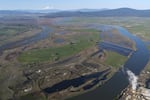According to a draft proposal released by Reclamation on Dec. 9, the Klamath Basin remains in “severe to extreme drought status” and dry weather is expected to continue for a fourth consecutive year. In response, the federal water management agency proposed reducing flows by up to 40% until April. Water is released from Upper Klamath Lake past a series of dams on its way to the Pacific Ocean.

The mainstem Klamath River running alongside Miller Island, looking towards Mt. Shasta.
Courtesy of Jason Jaacks/Ecoflight
The Klamath River will soon be the site of the nation’s largest dam removal and river restoration project. One of its key pillars involves restoring habitat for endangered coho salmon.
News of proposed reductions to the river’s flow was met with frustration by members of the Yurok Tribe, who just hours earlier had been joined by U.S. Secretary of the Interior Deb Haaland and the governors of Oregon and California at a celebration about the dam removal project. Reduced flows could further stress downriver coho and Chinook salmon populations.
“The Klamath salmon runs – the cohos – are down to their single digit percentages of their historical size. If we keep killing fish like this year after year after year, it just cuts away at the species’ ability to repopulate because then there’s not sufficient genetic diversity to repopulate the species,” said Amy Cordalis, a member of the Yurok Tribe, who is also an attorney for the tribe.
She said the last time river flows were as low as Reclamation’s current proposal was in 2002, the same year low water levels contributed to a massive fish die-off in the river. Cordalis said reducing flows could strand migrating fish and dewater nests of salmon eggs, called reds, further imperiling the population.
The Bureau of Reclamation declined to comment for this story. The federal water manager is again in the impossible position of having to split an over-allocated water supply four ways. Water must be balanced between the needs of ESA-listed species both above and below the dams, for the basin’s agricultural community, and for the nation’s oldest National Wildlife Refuges created for waterfowl, which are an important stopover for birds on the Pacific Flyway.
“If drought conditions persist, the Bureau of Reclamation may not be able to meet Endangered Species Act requirements for coho salmon, Southern Resident Killer Whales (which rely on Chinook salmon as a prey species) and for Lost River (C’waam) and shortnose suckers (Koptu). Conditions would also be extremely difficult for farmers, ranchers, and the National Wildlife Refuges if drought conditions persist, as these water users have received record low water deliveries during these last three years,” the agency wrote in a recent letter to stakeholders.
By limiting water flowing downriver, Reclamation hopes to refill Upper Klamath Lake to maintain water levels required for critically endangered sucker fish spawning habitat. The Lost River and shortnose suckers are culturally important to the Klamath Tribes.
The proposal from Reclamation was unusual in its brevity and the weekend-long window of time for comment. Moss Driscoll with the Klamath Water Users Association, a group that advocates for the Klamath Basin’s farming community, said the agency should act to keep water in the lake early during the wetter winter months.
“We’ve really done everything to urge that timely and appropriate action be taken to avoid harder decisions and more severe conflict later on this water year,” Driscoll said.
According to Reclamation, their staff will meet with tribes and Klamath Project farmers on Wednesday, Dec. 21 to discuss the water year ahead, and they will continue meeting until a plan is finalized.